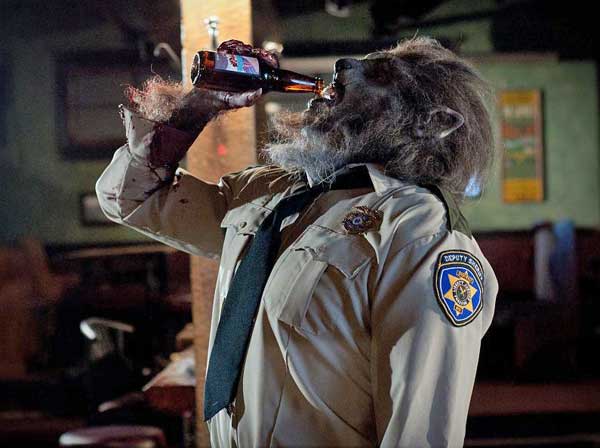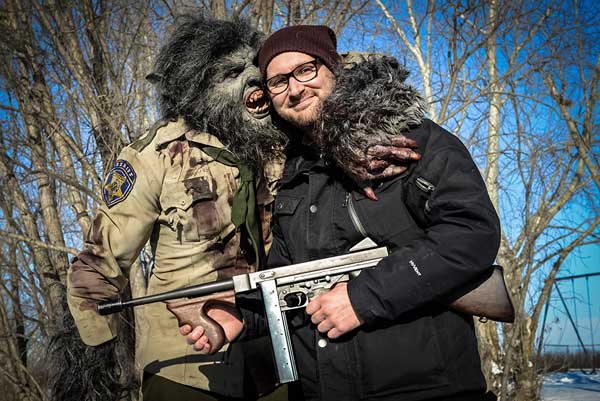Anyone who has been to see a film at a Cineplex theatre lately has been subjected to one of the ads for the Northern Gateway project prior to the main event. The ads, created with the help of Hill + Knowlton, known for their work with the tobacco industry, cost somewhere in the vicinity of $5 million. Every time I see one of these cartoon monstrosities at Cineplex, I think to myself: I never want to come back here again. Cineplex has turned filmgoing into a depressing affair, as artificial and false as the hydrogenated oil on the popcorn. I'm afraid WolfCop did not help matters.
WolfCop is the first film produced by Vancouver CineCoup's new Film Accelerator model. The basic idea is that would-be filmmakers pay $150 to submit their projects to the competition. From this original body of submissions, 10 projects are optioned for development, with one grand prize winner receiving project financing ($1 million) and a guaranteed release in Cineplex theatres. The projects were voted for on the basis of a two-minute trailer, and helped along by pained entreaties from the filmmakers, who mugged and made big eyes at the camera. (You can see all of the projects here.)
The initiative let the punters decide what film they would like to see come to life on the big screen. As part of the process, filmmaking teams created weekly clips and pitches to promote their progress and their projects. Even the most cursory look at the films in contention makes it evident that subtle is not often on the table. The stories are, for the most part, thin Hollywood re-imaginings. Watching them, I felt the same sadness that attends the briefest glance at any of the competition reality shows crowding the television screen at the moment. Watching people standing expectantly in front of a panel of judges, animal desperation leaking out of them like sweat, it's not hard to think that this is no way to create any kind of "art."
But maybe that's not the point. Art seems like a quaint old-fashioned notion anyway in this age of hype, pitch and buzz. Reading interviews with CineCoup's J. Joly could cause an aneurysm from jargon alone. To wit, in an early interview in Cult MTL magazine, Joly describes the impetus behind the project thusly: "I realized if I could create a robust back end, like a turnkey back end with the cloud and gamification, what we call trans-media bits, social voting -- all these components to create really cool companion experiences, what are now being called second screen."
Much has been made about the "social generation's" need for active participation and involvement in generating content. But is what looks to be democratic and accessible really all it's cracked up to be? After so much fanfare about CineCoup (I use the term advisedly), the endless entreaties and pitch sessions, and plugs from Cineplex's resident big-hair Michael Kennedy, what do you actually get?
You get WolfCop. I don't know whether to laugh or barf, or both simultaneously.
WolfBlah
The premise is this: in the hamlet of Woodhaven, a small-town cop named Lou Garrou (sigh) is having a bad day. Lou has a bit of a drinking problem, little work ethic and a bad case of the DTs. He drinks and lurches around town, doing as little actual police work as he can manage. His boss hates him. His partner is also less than charmed. He is, perhaps, the least likely person to help save the town from its deep dark secret, so naturally that is what happens.
Every few decades, just in time for the big Drink 'n' Shoot event -- a celebration of idiots that involves just that, drinking and shooting -- another event is also underway: the ritualistic creation and murder of a werewolf. But before we get to the main action, all the requisite types must be introduced, including teenage graffiti hoodlums, a bunch of violent drunks in Mac Jackets, the local gun-nut and conspiracy theorist, and an incongruously beautiful barmaid. Ah yes, small-town Canada. Grim as it ever was.
One evening, scruffy Lou, sporting a ferocious five o'clock shadow and enough eyeliner to make a glam rocker jealous, is sent out on a call to investigate mysterious happenings in the woods. He soon finds himself the victim of the town's big secret, awakening the next morning with fuzzy memories of ritualistic murder and a freshly carved pentagram in his chest. The experience has also left him with a keen sense of smell and a renewed interest in his profession, especially when a dead body turns up in the snow in the woods just outside of town. When the full moon rises over Woodhaven that night, Lou Garrou rips off his own skin and is revealed as a werewolf. He keeps drinking and eating doughnuts, though.
There isn't a great deal to be gained by trying to follow the plot; it is nonsensical at best. In quick summation, a group of shaping-shifting lizards (David Icke-types) have had the run of Woodhaven for years, due in part to the longevity granted them by drinking the blood of a werewolf. Lou is only the latest of many to have been subjected to this infernal plot, but thanks to his terrible drinking problem he is able to thwart their evil designs. Throw in a lunar eclipse, Gowan's '80s power ballad "Moonlight Desires," and exploding penises, and you have a crowd-pleaser, apparently.
In the theatre where I saw the film, groups of dudes and bros guffawed and whooped, but a weird edge of desperation ran along the rim of their noise. The audience wanted to laugh, they were primed and ready, but an odd flatness attended the film throughout, even in the most ridiculous of happenings. People got their faces torn off, their heads ripped off, and blood was sprayed in operatic, crimson arcs across the screen. Even when WolfCop transformed his squad car into a wolf-mobile, emblazoned with guns and sporting a big "W," driving around town peeing on naughty teenagers and bedding lusty women, I only wanted to look at my watch. The essential joke is that Lou is a better cop as a wolf than he ever was as a human. Hilarious, no?

I didn't hold out a great deal of hope that WolfCop would actually be good, but to be fair there are a few bits that are sort of okay. Leo Fafard, who plays our hairy hero, sleepwalks through his human incarnation, but gives his lupine self a bit more juice. He leaps about, blue-faced and red-lipped in his wolf persona, with some semblance of commitment. Jonathan Cherry, who plays his gun-toting friend Willie, has a few quips, and Amy Matysio does her best iron maiden rendition as Lou's partner, Officer Tina, a straight-laced cop with a heart of gold and a gun of steel. If nothing else, the film will force you to reconsider the work of Larry Gowan, seminal Canadian '80s rocker whose videos contain more genuine gonzo weirdness than a dozen WolfCops. (Who is that guy with cream cheese on his face in the "Moonlight Desires" video, and where did he get his poncho?)
The film is aiming for something of the Trailer Park Boys/Fubar vibe, a grand celebration of the great Canadian moron who loves beer, doughnuts and shooting guns. I don't mind films that aim for dumbness; certainly Canada had a fine tradition of making films for idiots about idiots. But if you're making trash, at least make it honest trash. Here is where WolfCop, for all its homage to garbage film, fails. The writing is hackneyed; the sound is absolutely horrendous (actors sound as if they are delivering their lines into a tin can, which is then broadcast into the theatre via a bit of string). If you're an adult, you will gently shake your head at such a mess. If you're 12 years old and/or a bro, you will scream "AWESOME!" until you puke.
Is this the new model?
Still, CineCoup's WolfCop is wending its way through theatres and festivals, and an orgy of self-congratulatory bonhomie pervades all. There is something so calculated and carefully coaxed about this bottoms-up approach, to give the people what they want, that it ends up subverting the very thing it was meant to be, namely genuine. As CineCoup's president of distribution and sales Brad Pelman put it in an interview with Fast Company: "What CineCoup has to prove is that through social media, sticky engagement and fan-based evangelizing of the films, we can bring a feature to Cineplex theatres knowing exactly who the audience is, where they live, and what they like."
Okay, but that doesn't mean that what you end up with is any good.
Canadian film could use all the help it can get at the moment, and some good intentions prompted CineCoup, apparently. The idea was to circumvent (disrupt) the old way of doing things and create a new model designed to appeal to the masses by the use of the masses. Other than a whole pack of documentaries, WolfCop is one of the only Canadian narrative films playing commercially at the moment. (The Grand Seduction is the other.) Narrative film in Western Canada is, at the moment, pretty thin. Will Canadian film production be re-invented by the bottoms-up model of film production? It remains to be seen. WolfCop may have garnered attention at the recent Cannes Festival, but it is a very different beast from the likes of David Cronenberg or Xavier Dolan, who walked down the red carpet causing critics to burble with joy and heap the pair with awards and accolades.
If one of the ideas behind CineCoup is to find and develop new talent, anything that isn't as cheesy as Velveeta has little chance of winning the grand prize. Listening to podcast interviews about the architecture behind the company, the language about creating a minimum viable product, and taking a target sniper approach to generating audience interest makes it rather explicit that this is about business and making money. It is as calculated as any other corporation that tracks and analyzes data attached to audiences in order to generate less risk for the bottom line.
Taking the approach of making filmmakers into entrepreneurs, endlessly marketing themselves and their product, evangelizing fans and getting sticky (sticky is a word that comes up often) may be novel, but there is something unsettling about it. Plans gallop apace to expand the idea, promote the CineCoup model worldwide and create action figures, vinyl records and all manner of accoutrements for the films, beginning with WolfCop.
But in spite of the endless marketing talk, what of the thing at the centre, the film itself? Despite all the sound and fury, there's something hollow about it. Perhaps no one can tell the difference between the film and its marketing, since it's all the same stuff. Although on some level, people still know: you can hear the emptiness in the forced hilarity in the theatre. The film started as an ad for itself and it pretty much ends there, with the promise of a sequel, Wolf Cop
II, in 2015. ![]()
Read more: Film
















Tyee Commenting Guidelines
Comments that violate guidelines risk being deleted, and violations may result in a temporary or permanent user ban. Maintain the spirit of good conversation to stay in the discussion.
*Please note The Tyee is not a forum for spreading misinformation about COVID-19, denying its existence or minimizing its risk to public health.
Do:
Do not: